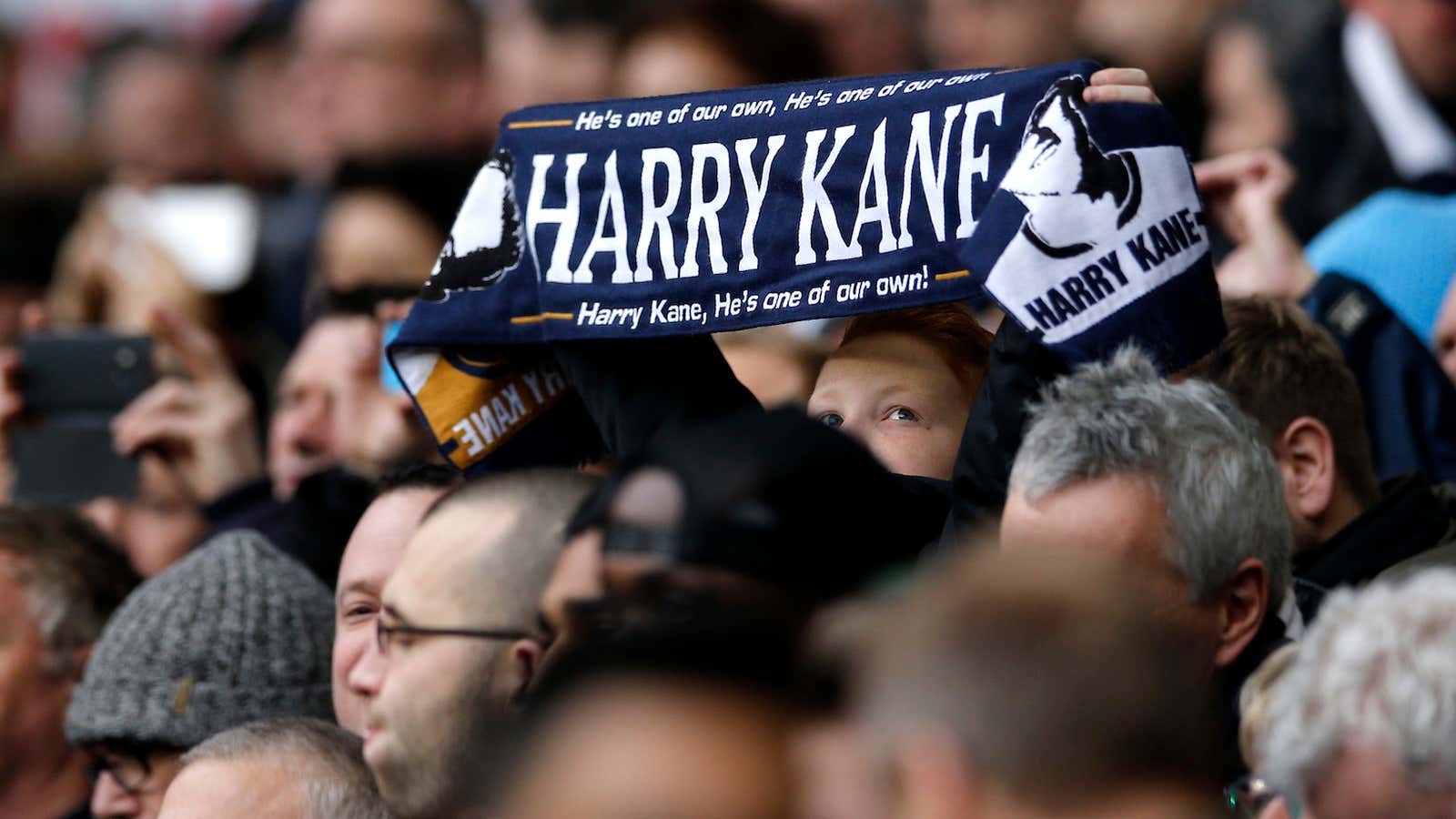He’s one of our own!
He’s one of our own!
Harry Kane, he’s one of our own!
The chant for the English Premier League’s top scorer is being sung full-throated by Tottenham Hotspur fans as the end of the season nears, celebrating the fact that the 22-year-old Chingford-born Englishman is a local lad. Kane’s success feeds into the tribalism of soccer—it’s us vs. them.
Off the pitch, too, a similar feeling is shared—by those in the UK who are in favor of “Brexit” when the UK votes on whether or not it will leave the European Union in a referendum next month. In fact, if Britain votes to leave, this could be one of the last seasons of English soccer as part of the 28-nation bloc.
With a global audience of 4.7 billion, what would that mean for the most watched and most exciting soccer league in the world?
‘Nothing to do with English people’
A couple of years ago, there was growing concern about the lack of English players in the Premier League. Greg Dyke, the chairman of English soccer’s governing body, went so far as to describe them as an “endangered species.” But many of the breakout stars of this year’s topsy-turvy season—like Harry Kane—are English.
For Kane to get into the team, he had to get ahead of foreign players like Roberto Soldado, Spurs’ most expensive player ever at $38 million. But he did—and Kane’s team and the English national squad are better for it. Trailing closely behind Kane in the scoring stakes is Leicester City wonderboy Jamie Vardy—another impressive English player fans can rabidly cling to as one of their own and who climbed up from the lower leagues into the England team.
Is the fierce competition within the Premier League for places driving up the quality of English players like Kane and Vardy, forcing them to be better players? Or are they just the tip of the iceberg, a demonstration of all the English talent that clubs are failing to find?
If you’re a Brit, your answer might reveal what side you take in Britain’s upcoming referendum. Brexit campaigners warn that immigration is “out of control“ (paywall) and that Britain would be subject to migration “free-for-all” if it were to stay in the EU. At the heart of this argument is the fear that migrants are taking British jobs, straining public services, and irrevocably changing British society.
This argument is reflected on the soccer pitch, too. The Football Association’s Dyke has previously warned that the Premier League is in danger of ”having nothing to do with English people.” His bold comments echo previous criticism of its clubs, which has been slammed for failing to utilize all the local talent in their youth academies.
Last year, out of the ”big five” European nations, the English Premier League had the highest percentage of expatriate players (57%) in their clubs, according to data from Football Observatory. That compares with France’s 30% and Germany’s 44%.
The study put the percentage of club-trained players in Premier League teams at a low of 11.7%, compared to 19.7% in Europe. The figure dropped below 20% for the first time since 2009.
Unsurprisingly, the five biggest clubs—Manchester United, Chelsea, Arsenal, Manchester City, and Liverpool—have some of the league’s highest percentage of active international players. Chelsea tops the list with 83%, with Manchester City and Arsenal coming in second and third place, respectively.
Comparing the England national team’s FIFA world ranking against other countries with major European leagues is also revealing. England hovers just outside the top 10, based on its average ranking since 1993—and is famously not very good. Spain has the second-lowest number of expatriates in its domestic league, but has dominated world football for a good chunk of the last decade.
Do fewer foreign players create more opportunities for domestic players, translating into better national team performances?
Former England and Arsenal defender Sol Campbell certainly thinks so. He argued that Britain leaving the EU would not only improve the English national team, but would also make the league more competitive. “If we had proper control of who can come in and out of Britain, we could attract the best of the best wherever they come from, while not letting in those who will be less of an asset,” he said.
Who gets to stay?
If you’re not one of the 27 other nations in the EU, you need a work permit to ply your trade in Britain—and that includes soccer.
Under the FA’s work-permit rules, a player’s eligibility to play is determined by the international ranking of their national team. So a Brazilian, for example, would have to play for his national team in at least 30% of its matches over the last two years in order to automatically qualify. The worse a country, the harder it is for their top players to get in.
If Brexit does occur, European players could be subject to these same work-permit regulations.
Campaigners argue that Brexit could dramatically reduce the number of European players in the Premier League, as many would not automatically qualify to enter the UK if the FA’s work permits were applied to them. An analysis by The Guardian suggests that two-thirds of players within the EEA (the EU, plus other nations like Iceland and Liechtenstein) wouldn’t meet the FA’s criteria to work in the Premier League.
That excludes big names like Juan Mata and David De Gea of Manchester United, Chelsea’s Kurt Zouma, and Manchester City’s Samir Nasri. (In all likelihood, those stars will stay safe if Brexit happens as the rules aren’t likely to be applied retroactively.)
That said, one of global football’s biggest stars would never have launched his career in England without the benefit of EU rules. Cristiano Ronaldo, the Real Madrid superstar and three-time Ballon d’Or winner, left his native Portugal at the age of 18 to play at Alex Ferguson’s Manchester United. That was 2003, and he hadn’t yet won his first cap for the Portugal senior team. Ronaldo could freely play in England because of the EU’s freedom of movement rules, but that wouldn’t have been possible if England hadn’t been part of the union.

“Cristiano Ronaldo would not have had a work permit, under the present rules, at the point he signed for Manchester United,” says Rory Miller of the University of Liverpool.
While those campaigning for Brexit emphasize the drawbacks of immigration, those wanting Britain to stay list the benefits of the EU’s freedom of movement (pdf). British chancellor George Osborne warned that the economy would shrink by 6% by 2030.
Dan Julian has been campaigning outside soccer stadia to convince soccer fans to vote for Britain to stay in the EU. One of the founders of Football Fans 4EU, he argues that Brexit could restrict clubs’ ability to recruit and develop young talent from the EU, leaving the Premier League worse off. “The Premier League is not only the most exciting league in the world, but it’s the most competitive,” he says.
Julian turns to the team he supports—Tottenham—to emphasize his point. Fans can’t gush about homegrown talent like Kane, he says, without also acknowledging the contributions of the young talent that Spurs has bought from across Europe, like French Algerian Nabil Bentaleb.
Nor can Vardy’s remarkable goals be distanced from the support of Riyad Mahrez and N’Golo Kanté—neither of whom are English.
“It’s by being in Europe and playing with the best players that can come here from a very young age that you can actually ensure our own players become better,” Julian says. In fact, some of the most remarkable partnerships in the Premier League, with the best goal-and-assist combinations, have been between English and foreign players.
The melting pot is what makes the Premier League so exciting. “If you take the multinational character of English teams out of the equation, you’re potentially going to lose quite a bit of your foreign audience,” Miller says.
The Superstar Effect
Migrants not only improve a team’s results, but also attract bigger crowds to stadiums, according to research (pdf) by Alex Bryson of the National Institute of Economic and Social Research, Giambattista Rossi of Birkbeck University, and Rob Simmons of Lancaster University. The research describes the impact of migrant soccer players as “the superstar effect.”
The study examined the player-data and results of Italian top-flight clubs between 2002 and 2008. The Italian Serie A was then widely viewed as the pre-eminent league of its time–much like today’s English Premier League. “There’s no question that at the time we were looking at the Italian data, it would have been optimal for more clubs to employ more migrants,” Bryson said.
This sort of migrant “superstar effect” might be dimmed somewhat in the Premier League in the event of Brexit, which could mean good news for other European leagues. “Now a big spender [free-spending English clubs] cannot purchase European talent anymore,” he said.
Brexit could also create an opportunity for non-European leagues to obtain European talent. “The price of talent would go down for the European talent that isn’t permitted to play in England. These players would be only bought by other leagues that are not strong as the European leagues, so it might be possible that leagues like the China’s might benefit, he said.
For now, the true impact of Brexit on the Premier League and the English national team will continue to be a guessing game for both camps. Not that this question of us vs. them is new. In soccer, the supporters have always been passionately parochial in contrast to their team’s cosmopolitanism. The Spurs side that won the FA Cup in 1901, for example, had no Londoners whatsoever in the team.
Tottenham fans may be able to celebrate Harry Kane’s origins, but English teams have always been made up of players that were foreign—at least as far as the fans were concerned.
